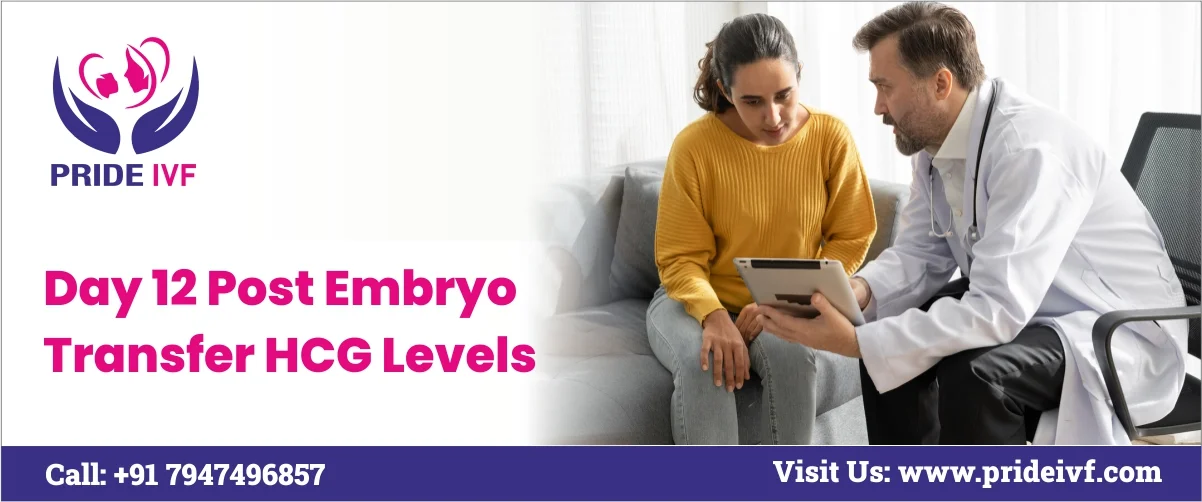Are you wondering about your day 12 post embryo transfer hCG levels? After undergoing embryo transfer, it’s natural to eagerly await signs of pregnancy. One crucial indicator is the hCG hormone, essential for supporting early pregnancy. This blog aims to explain what your day 12 hCG levels signify, guiding you through this pivotal stage in your fertility journey.
Understanding hCG Levels in Early Pregnancy
Understanding hCG Levels in Early Pregnancy begins with grasping the science behind embryo transfer and its connection to hCG. When an embryo is transferred into the uterus during assisted reproductive techniques like IVF, the body begins a complex process of potential pregnancy.
Human Chorionic Gonadotropin (hCG), a hormone produced by the developing placenta after implantation, plays a pivotal role in this journey. It serves as a biochemical signal that a pregnancy has occurred, crucially supporting the implantation of the embryo into the uterine lining.
This hormone ensures the continuation of early pregnancy by stimulating the corpus luteum in the ovary to produce progesterone, which maintains the uterine lining and supports fetal development. Essentially, hCG acts as a biological marker indicating successful embryo implantation and early fetal development.
Understanding its significance provides insights into the progression of early pregnancy and aids in assessing the health and viability of the pregnancy in its initial stages.
Day 12 Post Embryo Transfer: What It Means
The 12th day after embryo transfer is a significant milestone in the IVF journey. It’s the time when the first hCG test is typically performed to determine if the embryo has successfully implanted in the uterus. This timing is crucial because it provides an early indication of pregnancy. By this point, if the embryo has implanted, the body should produce measurable levels of hCG.
The reason day 12 is chosen for the initial hCG test is based on the biological timeline of implantation and subsequent hormone production. After the transfer, the embryo takes a few days to implant into the uterine lining. Once implantation occurs, the cells surrounding the embryo begin to produce hCG. By day 12, enough hCG should be present in the blood to detect pregnancy. This early test helps in making timely decisions about the next steps in the fertility treatment.
What Do Your Day 12 hCG Levels Tell Us?
A positive day 12 post embryo transfer hCG levels at this stage is an encouraging sign. It indicates that the embryo has been implanted and is starting to develop. Typically, a positive result means hCG levels are above 50 mIU/mL, but this threshold can vary slightly between clinics.
Understanding the Significance of Different hCG Levels
Different hCG levels can indicate various scenarios:
- Normal Range: An hCG level within the expected range is a good sign that the pregnancy is progressing normally.
- Low hCG Levels: If the hCG level is lower than expected, it could indicate a potential issue with the pregnancy, such as an ectopic pregnancy or a risk of miscarriage. However, it’s important to note that one low reading is not definitive. Follow-up tests are necessary to monitor the trend of hCG levels.
- High hCG Levels: Higher than expected hCG levels could suggest multiple pregnancies (twins or more) or, in rare cases, a molar pregnancy. Again, further testing and monitoring are essential to determine the exact cause.
Factors Influencing Your hCG Levels
Several factors can influence hCG levels:
- Age: Older women may have different hCG production rates compared to younger women.
- Embryo Quality: The quality of the transferred embryo can impact implantation success and hCG production. Higher-quality embryos are more likely to implant successfully and produce normal hCG levels.
- Number of Embryos Transferred: Transferring multiple embryos can result in higher hCG levels, especially if more than one embryo implants.
- Type of Fertility Treatment: Different protocols and medications used during IVF can influence hCG levels and the timing of implantation.
Preparing for the Next Steps
The waiting period for hCG results can be emotionally challenging. It’s common to feel anxious, hopeful, or even stressed. To manage these emotions, try to focus on self-care activities such as meditation, light exercise, or spending time with loved ones. Seeking support from your partner, friends, or a support group can also provide comfort during this uncertain time. Remember, each journey is unique, and staying positive and connected with your clinic can help ease the anxiety.
The Clinic’s Role in Supporting You
International Pride IVF Centre is renowned for its compassionate and professional care in fertility treatments. After your day 12 hCG test, the clinic will review your results with precision and care. If your hCG levels after embryo transfer is within the expected range, they will schedule follow-up tests to monitor the hormone’s rise and ensure the pregnancy is progressing well.
In cases where hCG levels are lower than anticipated, the clinic will guide you through additional testing or supportive treatments. The dedicated team at International Pride IVF Centre is committed to providing personalized support, helping you understand each step of your fertility journey, and making the best decisions for your care.
Conclusion
Awaiting your results of day 12 post embryo transfer hCG levels can be a challenging time, but remember you are not alone. The team at International Pride IVF Centre is here to support you every step of the way. Stay positive and reach out for support when needed. If you have any questions or need further assistance, please contact International Pride IVF Centre in Delhi. We are committed to helping you achieve your dream of starting a family with care and compassion.
FAQs
1. What if my hCG level isn’t doubling perfectly?
Not all pregnancies adhere strictly to doubling hCG levels. Minor fluctuations are normal. Your doctor will observe the trend through subsequent tests to ensure pregnancy progression and address any concerns accordingly.
2. Can a low hCG level still lead to a healthy pregnancy?
Yes, pregnancies with initially low hCG levels can still progress normally. It’s important to conduct follow-up tests to monitor the trend and ensure the pregnancy continues to develop as expected.
3. Is it normal to have no symptoms even with a positive hCG test?
Yes, it is entirely normal for women to have no symptoms early in pregnancy, despite a positive hCG test. Symptoms can vary widely among individuals and may develop gradually over time.
4. How soon after a positive hCG test should I have an ultrasound?
Typically, an ultrasound to confirm fetal heartbeat is scheduled around 6-7 weeks after a positive hCG test. This timing allows for an accurate assessment of early pregnancy development and viability.
5. Can medication affect my hCG levels?
Certain medications, such as fertility drugs or medications containing hCG itself, can affect hCG levels. It’s crucial to inform your doctor about all medications, as they can impact the interpretation of your hCG results.




